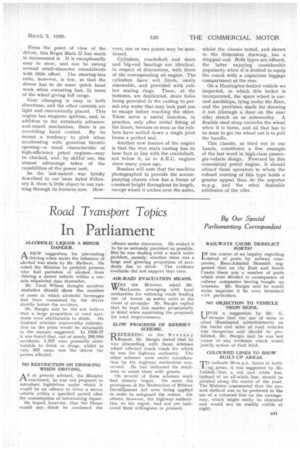Road Transport Topics By Our Special In Parliament Parliamentary Correspondent
Page 41

If you've noticed an error in this article please click here to report it so we can fix it.
ALCOHOLIC LIQUOR A MINOR DANGER.
ANEW suggestion for preventing driving when under the influence of alcohol was made by Mr. Mathers. He asked the Minister to prohibit persons who had partaken of alcohol from driving a motor vehicle within a certhin stipulated time thereafter.
Mr. Cecil Wilson thought accident statistics should show the number of cases in which alcoholic beverages had been consumed by the driver shortly before the accident.
Mr. Burgin said he did not believe that a large proportion of road accidents were attributable to drink. He doubted whether trustworthy information on the point would be obtainable in the manner suggested. In 1.036-37 it was found that, out of nearly 200,000 • accidents, 1,307 were primarily attributable to drink or drags, whilst in only 567 cases was the driver the person affected.
NO RESTRICTION ON DRINKING WHEN DRIVING.
AS at present advised, the Minister continued, he was not prepared to introduce legislation under which it would he an offence to drive a motoi vehicle within a specified period after the consumption of intoxicating liquor.
He hoped, however, that the House would not think he condoned the offence under discussion. He wished it to be as seriously punished as possible. But he was dealing with a much wider problem, namely, whether there was a large and growing proportion of accidents due to drink. The evidence available did not support that view.
AIR-RAID EVACUATION MEANS.
WAS the Minister, asked Mr.
MacLaren, arranging with local authorities for widening roads leading out of towns as safety exits in the event of air-raids? Mr. Burgin replied that he kept this matter prominently in mind when examining the proposals for road improvements_ SLOW PROGRESS OF BRESSEY SCHEME.
REFERRING to the • Bressey Report, Mr. Burgin stated that be was proceeding with those schemes which affected trunk roads for which he was the highway authority. The other schemes were under consideration by the highway authorities concerned. He had indicated his readiness to assist them with grants.
On several of these schemes work had already begun. On some the provisions of the Restriction of Ribbon Develhment Act were being applied in order to safeguard the routes. On others, however, the highway authorities, to his regret, had not yet indicated their willingness to proceed. RAILWAYS CAUSE DERELICT PORTS?
I N the course of an inquiry regarding control of ports by railway companies, Rear-Admiral Beamish suggested that on the East and South Coasts there was a number of ports which were derelict in consequence of railway companies having bought up interests. Mr. Burgin said he would make inquiries if he were furnished with particulars.
NO OBJECTION TO VEHICLE NEON SIGNS.
UPON a suggestion by Mr. G. ‘../ Strauss that the use of neon or other illuminated advertisements on the backs' and sides of road vehicles was dangerous and should be prohibited, Mr. Burgin said he was not aware of any evidence which would justify action of that kind,
COLOURED LINES TO SHOW BUILT-UP AREAS.
TO indicate 20-m.p.h. limits in built'up. areas, it was suggested by Mr. Liddall• that a red and white line, instead of an all-white line, should be painted along the centre of the road. The Minister commented that the present method was to be preferred to the use of a coloured line on the carriageway, which might easily be obscured and would not be readily visible at night.




















































































